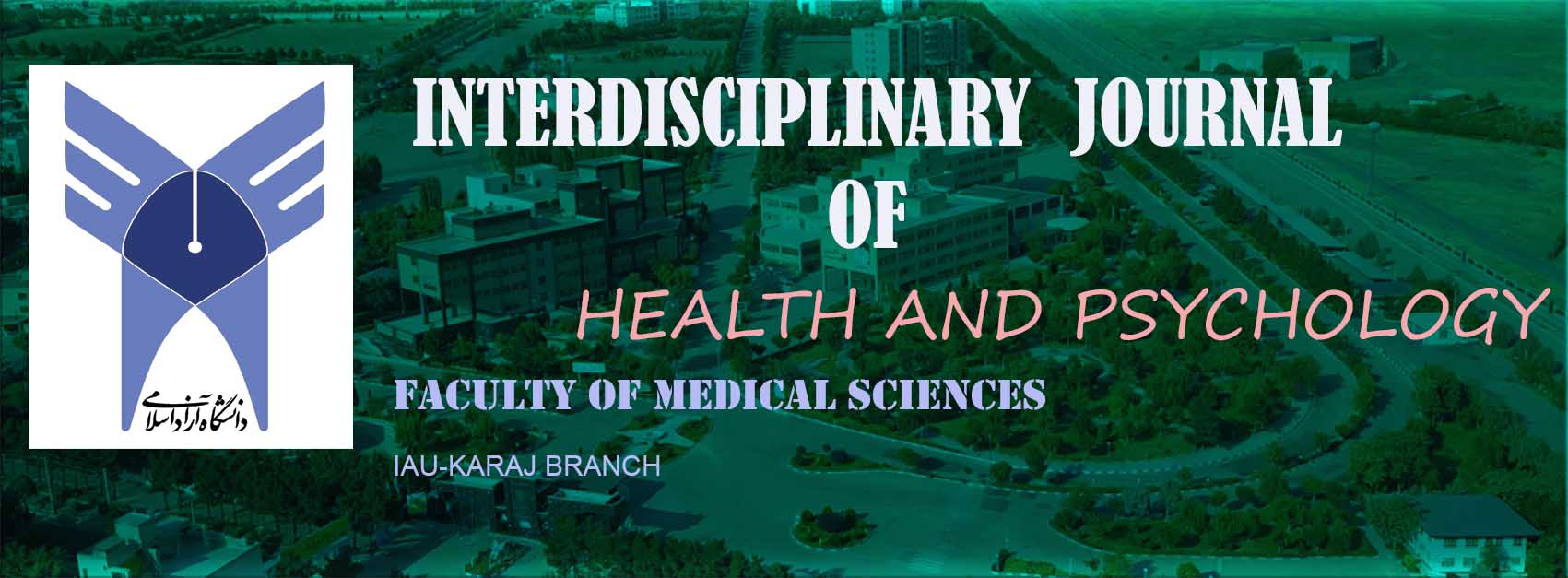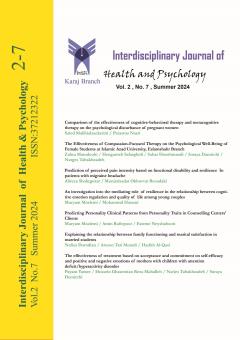The effectiveness of treatment based on acceptance and commitment on self-efficacy and positive and negative emotions of mothers with children with attention deficit/hyperactivity disorder Payam Varaee / Hossein Ghasemian Reza Mahalleh / Narjes Tabakhzadeh / Soraya Demirchi
Subject Areas : acceptance and commitment therapy
Keywords: Keywords: treatment based on acceptance and commitment, self-efficacy, positive and negative affect, anxiety disorder,
Abstract :
Abstract The purpose of this study was to investigate the effectiveness of acceptance and commitment therapy on self-efficacyand positive and negative emotions of mothers with children with attention deficit/hyperactivity disorder. The research method was semi-experimental with a pre-test-post-test design with a control group. The statistical population was all mothers with children suffering from attention deficit/hyperactivity disorder in Qom city in 2024, and 30 of them were selected as a sample using the available method. The subjects completed the questionnaire of general self-efficacy and positive and negative emotions, and the experimental group received treatment based on acceptance and commitment in 8 sessions of 90 minutes .The obtained information was analyzed by multivariate covariance analysis and spss software. The findings showed that treatment based on acceptance and commitment led to an increase in the scores of mothers with children with attention deficit/hyperactivity disorder in the dimensions of self-efficacy and the components of general self-efficacy, social self-efficacy and overall self-efficacy and an increase in their scores in positive affect and a decrease in scores. Affection has become negative. Therefore, counselors and therapists of clinical centers can benefit from psychological interventions such as therapy based on acceptance and commitment in increasing self-efficacy and positive emotion and reducing negative emotion.
منابع
احمدی اکرم، رئیسی زهره. اثربخشی درمان مبتنی بر پذیرش و تعهد بر خودکارآمدی مادران دارای کودک اوتیسم. فصلنامه علمی- پژوهشی خانواده و پژوهش. ۱۳۹۸; ۱۶ (۲) :۱۲۳-۱۳۷
Antshel KM, Barkley R. (2020)Attention deficit hyperactivity disorder. Handb Clin Neurol. ;174:37-45. [PubMed ID: 32977893]. https://doi.org/10.1016/B978-0-444-64148-9.00003-X.
Behnke, M., Buchwald, M., Bykowski,
A., Kupiński, S., & Kaczmarek, L. D. (2022). Psychophysiology of positive and negative emotions, dataset of 3317 cases and 0 biosignals. Scientific Data, 9(3), 3-31
Cabral MDI, Liu S, Soares N. Attention-deficit/hyperactivity disorder: diagnostic criteria, epidemiology, risk factors and evaluation in youth. Transl Pediatr. 2020;9(Suppl 1):S104-13. [PubMed ID: 32206588]. [PubMed Central ID: PMC7082246]. https://doi.org/10.21037/tp.2019.09.08.
Chisari, C., McCracken, L. M., Cruciani, F., Moss-Morris, R., & Scott, W. (2022). Acceptance and Commitment Therapy for women living with Vulvodynia: A singlecase experimental design study of a treatment delivered online. Journal of Contextual Behavioral Science, 21, 31-13
Condo, J. S., Chan, E. S., & Kofler, M. J. (2022). Examining the effects of ADH symptoms and parental involvement on children’s academic achievement.
Hosseini, S. K., Fard, R. J., & Shoushtari, M. T. (2024). The Effectiveness of Acceptance and Commitment Therapy on Emotion Regulation, Behavioral Symptoms, and Academic Performance of Children with Attention Deficit/Hyperactivity Disorder. Journal of Clinical Research in Paramedical Sciences, 13(1).
Research in Developmental Disabilities, 322, 333311.
Datu, J. A. D., Valdez, J. P. M., McInerney, D. M., & Cayubit, R. F. (2022). The effects of gratitude and kindness on life satisfaction, positive emotions, negative emotions, andCOVID‐39 anxiety: An online pilot experimental study Applied Psychology: Health and Well‐Being, 33(2), 137-113.
Gan, Y., & Fu, Q. (2022). Risk perception and coping response to COVID-39 mediated by positive and negative emotions: A study on Chinese college students. Plos one, 37(3), e3212313.
Hayes, S. C., Levin, M. E., Plumb-Vilardaga, J., Villatte, J. L., & Pistorello, J. (2013). Acceptance and commitment therapy and contextual behavioral science: Examining the progress of a distinctive model of behavioral and cognitive therapy. Behavior Therapy, 33(2), 303-390.
Hann, K. J., McCracken, L M. (2014). A systematic review of randomized controlled trials of Acceptance and Commitment Therapy for adults with chronic pain: Outcome domains, design quality, and efficacy. Journal of Contextual Behavioral Science, 1(3), 237-227
Kivumbi A, Byansi W, Damulira C, Namatovu P, Mugisha J, Sensoy Bahar O, et al. Prevalence of behavioral disorders and attention deficit/hyperactive disorder among school going children in Southwestern Uganda. BMC Psychiatry. 2019;19(1):105. [PubMed ID: 30943981]. [PubMed Central ID: PMC6446353]. https://doi.org/10.1186/s12888-019-2069-8. Kring, A. M., Davison, G. C., Neale, J. M., Johnson, S. L. (2014). Abnormal psychology, Translated By Hamid Shamsipour. Tehran: Arjmand Pub.
Leader G, Moore R, Chen JL, Caher A, Arndt S, Maher L, et al. (2022).Attention deficit hyperactivity disorder (ADHD) symptoms, comorbid psychopathology, behaviour problems and gastrointestinal symptoms in children and adolescents with autism spectrum disorder. Ir J Psychol Med.;39(3):240-50. [PubMed ID: 33973506]. https://doi.org/10.1017/ipm.2020.135.Lin, T., Heckman, T. G., & Anderson, T. (2022). The efficacy of synchronous teletherapy versus in-person therapy: A meta-analysis of randomized clinical trials. Clinical Psychology: Science and Practice, 29(2), 317.
Leader G, Moore R, Chen JL, Caher A, Arndt S, Maher L, et al. Attention deficit hyperactivity disorder (ADHD) symptoms, comorbid psychopathology, behaviour problems and gastrointestinal symptoms in children and adolescents with autism spectrum disorder. Ir J Psychol Med. 2022;39(3):240-50. [PubMed ID: 33973506]. https://doi.org/10.1017/ipm.2020.135.
Magnus, W., Nazir, S., Anilkumar, A. C., & Shaban, K. (2023). Attention Deficit Hyperactivity Disorder. In StatPearls. StatPearls Publishing.
Maghsoudi, Z., Razavi, Z., Razavi, M., & Javadi, M. (2019). Efficacy of acceptance and commitment therapy for emotional distress in the elderly with type 2 diabetes: A randomized controlled trial. Diabetes, Metabolic Syndrome and Obesity: Targets and Therapy, 32 , 2317
Matteucci, M. C., Scalone, L., Tomasetto, C., Cavrini, G., Selleri, P. (2019). Healthrelated quality of life and psychological wellbeing of children with Specific Learning Disorders and their mothers. Research in Developmental Disabilities, 07: 31-11.
Molazamani F, Bavi S, Jayervand H.(2023) .Effects of a Computer-Based Intervention on Sustained Attention, Divided Attention, and Impulsivity in Children with Attention Deficit Hyperactivity Disorder. J Clin Res Paramed Sci.;12(2)
Montaner, X., Tárrega, S., Pulgarin, M., & Moix, J. (2022). Effectiveness of acceptance and commitment therapy (ACT) in professional dementia caregivers burnout. Clinical gerontologist, 31(3), 931-921.
Maddux, J. E., & Gosselin, J. T. (2022). Self-efficacy. The Guilford Press
McCracken, L. M., Sato, A., Taylor, G. J. (2013). A Trial of a Brief Group-Based Form of Acceptance and Commitment Therapy (ACT) for Chronic Pain in General Practice: Pilot Outcome and Process Results. The Journal of Pain, 33 (33), 3190-3331
Olsen, K. N., Powell, M., Anic, A., Vallerand, R. J., & Thompson, W. F. (2022). Fans of violent music: The role of passion in positive and negative emotional experience. Musicae Scientiae, 21(2), 113-107.
Oren, G., Poria, Y., & Reichel, A. (2022). The positive role of negative emotions in
heritage-site visits: The case of Auschwitz Death Camp. Journal of Heritage Tourism, 37(2), 310-371
Paulos-Guarnieri, L., Linares, I. M. P., & El Rafihi-Ferreira, R. (2022). Evidence and characteristics of Acceptance and Commitment Therapy (ACT)-based interventions for insomnia: A systematic review of randomized and non-randomized trials. Journal of Contextual Behavioral Science, 21, 3-33.
Reyes, A. T. (2022). The process of learning mindfulness and acceptance through the use of a mobile app based on acceptance and commitment therapy: a grounded theory analysis. Issues in Mental Health Nursing, 31(3), 1-32.
Rizzutti S, Schuch V, Augusto BM, Coimbra CC, Pereira JP, Bueno OF. Neuropsychological Profiles Correlated with Clinical and Behavioral Impairments in a Sample of Brazilian Children with Attention-Deficit Hyperactivity Disorder. Front Psychiatry. 2015;6:163. [PubMed ID: 26635638]. [PubMed CentralID: PMC4661035]. https://doi.org/10.3389/fpsyt.2015.00163.Rodwell, D., Bates, L., Larue, G. S., Watson, B., & Haworth, N. (2022). Parents’ selfefficacy and the quality of supervised driving practice they provide for their children. Transportation research part F: traffic psychology and behaviour, 07 , 30.
Sibley MH, Swanson JM, Arnold LE, Hechtman LT, Owens EB, Stehli A, et al.(2017) .Defining ADHD symptom persistence in adulthood: optimizing sensitivity and specificity. J Child Psychol Psychiatry.;58(6):655-62. [PubMed ID: 27642116]. [PubMed Central ID: PMC5809153]. https://doi.org/10.1111/jcpp.12620.
Schunk, F., Zeh, F., & Trommsdorff, G. (2022). Cybervictimization and well-being among adolescents during the COVID-39 pandemic: The mediating roles of emotional self-efficacy and emotion regulation. Computers in human behavior, 321, 337311
Twohig, M. P. (2014). Acceptance and commitment therapy: Introduction. Cognitive and Behavioral Practice, 39(3), 399-137.
Wilens TE, Spencer TJ. Understanding attention-deficit/hyperactivity disorder from childhood to adulthood. Postgrad Med. 2010;122(5):97-109. [PubMed ID: 20861593]. [PubMed Central ID: PMC3724232]. https://doi.org/10.3810/pgm.2010.09.2206
Watson, D., Clark, L. A., & Tellegen, A. (1998). Development and validation of briefmeasures of positive and negative affect: the PANAS scales. Journal of personality and social psychology, 13(1), 3311.
Wilens TE, Spencer TJ.(2010). Understanding attention-deficit/hyperactivity disorder from childhood to adulthood. Postgrad Med.;122(5):97-109. [PubMed ID: 20861593]. [PubMed Central ID: PMC3724232]. https://doi.org/10.3810/pgm.2010.09.2206.
Yoo HJ, Han JM, Kim K, Song G, Yee J, Chung JE, et al. Association between attention deficit hyperactivity disorder and aggression subscales in adolescents. Brain Behav. 2021;11(3). e02030. [PubMed ID: 33439553]. [PubMed Central ID: PMC7994686]. https://doi.org/10.1002/brb3.2030.

